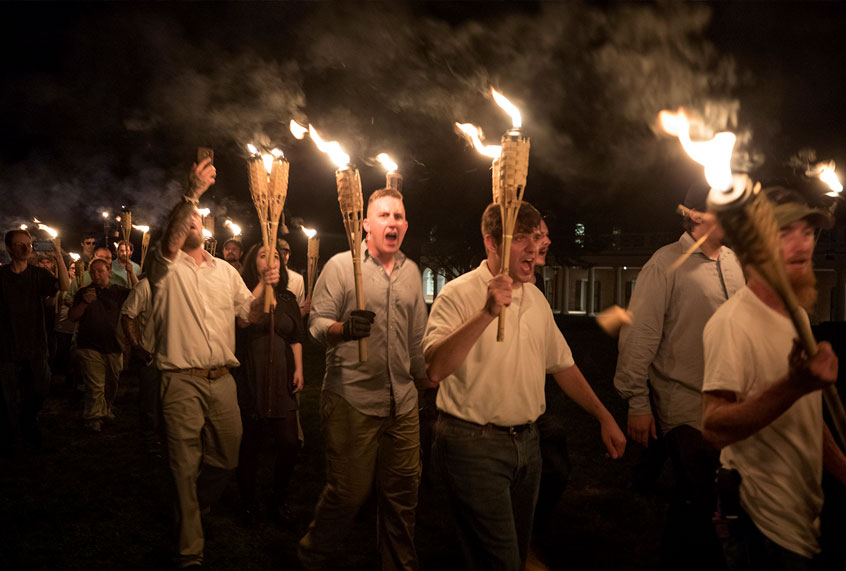A growing number of Republican pundits and politicians are entertaining or outright embracing the “great replacement” theory — a once-fringe white nationalist worldview that in recent years has crept into mainstream political discourse.
This theory, apparently first popularized in 2012 in a self-published book by the eccentric French novelist and diarist Renaud Camus, proposes that a cabal of liberals or global elites is attempting to “replace” the white European populace with nonwhite or non-European minorities. This idea had very little traction in America until recently, at least outside the fringes of the far right. But over the past few years, some prominent conservatives who are not overtly white supremacist have begun to embrace this notion publicly, claiming that their political opponents are enacting pro-immigration policies in order to diminish the electoral power of white voters.
In 2017, the term and the idea were abruptly thrust into the national spotlight when hundreds of neo-Nazis, white supremacists and far-right activists gathered in Charlottesville, Virginia, to protest their perceived disenfranchisement, chanting slogans like “Jews will not replace us.” That “Unite the Right” rally, which erupted into violence that led to the death of one leftist counter-protester as well as many injuries, made clear that racialized white grievance was now a feature of the political landscape.
In the years following, various Republicans have supported various versions of the “great replacement” theory, including Florida state Sen. Dennis Baxley, former U.S. Rep. Steve King of Iowa and Maine Republican vice chair Nick Isgro, all of whom suggested that supporters of legal abortion were deliberately causing a decline in the birth rate among white Americans.
At least three mass shootings have apparently been inspired by the “great replacement” idea: The Tree of Life synagogue killings in Pittsburgh in 2018, the mosque shootings in Christchurch, New Zealand in March 2019, and the El Paso Walmart massacre in August 2019.
Want a daily wrap-up of all the news and commentary Salon has to offer? Subscribe to our morning newsletter, Crash Course.
After those atrocities, the theory appeared to receded from the national discourse — but not forever. Fox News primetime star Tucker Carlson brought it back with a vengeance, saying on the air this April that the Democratic Party was “trying to replace the current electorate” with “new people, more obedient voters from the Third World.” There have been calls ever since from progressive and antiracist groups for Carlson’s firing — but his fans and followers loved it.
Over the past few months, several prominent Republicans have begun to deploy “great replacement” rhetoric, invoking vague fears about whites being supplanted by ethnic minorities, or even by naming the theory openly.
Last week, Rep. Matt Gaetz, the embattled Florida Republican who has reportedly been under federal investigation for months, tweeted that Carlson was “CORRECT about Replacement Theory as he explains what is happening to America,” even taking a moment to describe the Anti-Defamation League as “a racist organization.” Rep. Brian Babin, R-Texas, made nearly the same claims in a Newsmax interview, saying that Democrats “want to replace the American electorate with a Third World electorate that will be on welfare.”
Some Republicans have been at least a bit subtler, alluding to concerns around an influx of minorities changing the cultural fabric of the nation.
Rep. Elise Stefanik, R-N.Y., who recently replaced Rep. Liz Cheney as chair of the House Republican Conference, warned her voters in an ad blitz two weeks ago that Democrats were planning “a PERMANENT ELECTION INSURRECTION” by expanding pathways to citizenship.
In early September, Texas Lt. Gov. Dan Patrick reiterated these concerns to Fox News host Laura Ingraham, warning of a “silent revolution by the Democrat Party and Joe Biden to take over the country.”
Citing Biden’s alleged plan to loosen borders and admit more immigrants, Patrick said that if “every one of them has two or three children, you’re talking about millions and millions and millions of new voters.”
In April of this year, Sen. Ron Johnson, R-Wis., and Rep. Scott Perry, R-Pa., also echoed these sentiments. “For many Americans,” Perry said during a committee hearing, “what seems to be happening, or what they believe right now is happening, is, what appears to them is, we’re replacing national-born American — native-born Americans, to permanently transform the landscape of this very nation.”
It also seems possible, and perhaps likely, that belief in the possibility of a “great replacement” theory is widespread among Donald Trump’s supporters and the Republican base. According to a survey conducted by political scientist Robert Pape, a majority of those who participated in the Jan. 6 Capitol riot, as the New York Times reports, were “awash in fears that the rights of minorities and immigrants were crowding out the rights of white people in American politics and culture.”

